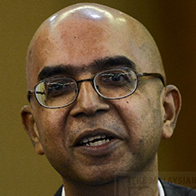Discussions of Major Zaidi Ahmad have focused on his actions. The motive behind his actions has received scant attention.
I have read two blog posts by ex-Air Force men about Major Zaidi.
The evidence of two blog posts doesn’t provide a reliable measure of what airmen think of the whole affair, let alone what other members of the uniformed forces think.
However, the two blog posts and the comments they attracted give us an insight into the shock waves Major Zaidi has sent through the armed forces.
Like the two bloggers, the commenters appear to be airmen and officers. They seem to agree that (1) Major Zaidi held a press conference which (2) was not sanctioned by the Defence Ministry and (3) in doing so he disobeyed standing orders.
The airmen do not consider Major Zaidi a hero. They consider Major Zaidi a man who broke ranks and is guilty of insubordination. They are disappointed that many on Facebook now use a graphic of Major Zaidi as their profile picture. They think all who hail Major Zaidi as a hero are fools used as tools by those who oppose the government.
I have pondered the blog posts and the comments. I am struck by the fact that the airmen (1) think Major Zaidi held a press conference and (2) don’t touch on Major Zaidi’s last words to the tribunal: “See you in Allah’s court.”
Did Major Zaidi hold a press conference?
What does holding a press conference entail? Anyone who has attempted to call a press conference knows how hard it is to get anyone from the media to come. You have to send out a “juicy” notice, make calls and give ample time.
If you make a police report, then speak with the press who are waiting outside the police station, it’s a stretch to say you’ve “organised a press conference”.
Major Zaidi was not found guilty of holding a press conference.
Major Zaidi was initially charged with seven offences.
The prosecution dropped five of the charges.
The tribunal found the major guilty of two charges: (1) speaking to the media without authorisation (about the failed ink) and (2) sharing confidential information without authorisation (about his being grounded).
The first conviction concerns the police report Major Zaidi made. The Air Force does not say making the report was an offence. The Air Force says the major committed an offence by using the media to make public the contents of his police report. Are police reports confidential? That’s all I have to say about the first conviction.
The second conviction concerns the letter. The matter of the failed ink was (and remains) a very public matter. A senior officer in the Air Force, a decorated hero, had made a police report about the failed ink. The public considered this a feather in the Air Force’s cap. The public wanted to know how the Air Force would next use Major Zaidi. The media wanted to oblige.
However, it turned out Major Zaidi had misjudged the Air Force. He now saw clearly that the Air Force had decided to make him a villain. He went public. The public’s bubble of hope was burst: the Air Force was treating Major Zaidi not as a hero but as a villain.
Perhaps the bloggers do not see it this way because they are accustomed to blindness, deafness and dumbness as the route to promotion.
Perhaps the bloggers are annoyed that Major Zaidi’s response to the Air Force’s decision to ignore the failed ink forced them to face a truth they would rather avoid: obeying Allah can be costly.
Major Zaidi has offended many.
It appears many in the uniformed forces think Major Zaidi saw in the failed ink an opportunity to draw attention to himself and – whether as collateral damage or not – to discredit the silent ones in uniform. The major claims Allah required of him, a decorated officer, to declare “the ink has failed”.
(Major Zaidi encourages Muslims to perform the haj early. In a book he authored, he says being called “haji” makes one less prone to sin.)
Is Major Zaidi an opportunist who capitalised on a media opportunity? Is Major Zaidi a patriot who thought the Defence Ministry was less likely to ignore the failed ink if he went public? Is Major Zaidi a man who misread the willingness of his superiors to demand that the Election Commission be accountable? Is Major Zaidi a man who chose to obey God rather than man?
When I engage those who express opinions about Major Zaidi I ask: what do you say was Major Zaidi’s motive for the two actions for which he has been found guilty? – February 5, 2015.
* This is the personal opinion of the writer or publication and does not necessarily represent the views of The Malaysian Insider.


Comments
Please refrain from nicknames or comments of a racist, sexist, personal, vulgar or derogatory nature, or you may risk being blocked from commenting in our website. We encourage commenters to use their real names as their username. As comments are moderated, they may not appear immediately or even on the same day you posted them. We also reserve the right to delete off-topic comments